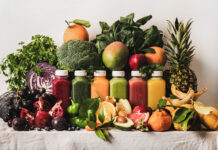
On a global scale, the majority of consumers (85%) have shifted to shopping more sustainably over the past five years. For food and beverage store purchases, specifically, 62% of North American consumers say sustainability is a strong influencer. It’s even more of a priority when shopping for dairy, meat, or their alternatives.
But just how important is sustainability to consumers? Important enough to outweigh other purchase influencers like price and convenience? And who do they hold accountable for creating a more sustainable world?
Here’s a closer look at consumer understanding of sustainability and how it shapes their shopping behaviors and expectations of food and beverage companies.
What does sustainability mean to consumers?
As more consumers become aware of and prioritize sustainability, its definition has expanded well beyond eco-friendly packaging. A study from Kerry shows that global consumers associate sustainability with several other concerns, including:
- Public hygiene and sanitation (80%)
- Environment and atmosphere preservation (80%)
- Food waste (78%)
- Health and nutrition (77%)
- Animal welfare and protection (76%)
Today’s consumers also consider social responsibilities — such as community service, advocacy for human rights, and ethical treatment of workers — to be a part of the sustainability movement.
 How do they judge if a product is sustainable?
How do they judge if a product is sustainable?
Despite the broadening definition, most consumers turn first to a product’s packaging to determine its sustainability. More than half say eco-friendly packaging tells them a product is sustainable, with recyclable (49%) and biodegradable (48%) packaging being their most preferred types.
Among the 53% of consumers who say it’s important that their food be produced in an environmentally sustainable way, many look for packaging indicators like recyclable packaging (51%), sustainably sourced labels (46%), and reusable packaging (41%).
Four in ten consumers check ingredients to identify sustainable products.
Are they willing to pay more for sustainable products?
Deciding what products to buy is one of the primary ways consumers communicate their sustainability values. But if the price of sustainable products is higher than that of other products, will they still choose sustainability?
Taste, price, healthfulness, and convenience all rank above sustainability as the top drivers of food purchasing decisions. So a consumer’s willingness to pay more for sustainable products will depend on how important sustainability is to them and how much extra they have to spend.
Eight in ten consumers are willing to pay at least a little more for sustainable food and drink products, though only 16% are willing to pay significantly more. On the other hand, a more expensive price tag is the primary reason consumers choose not to buy sustainable products (across all consumer products, not just food), with 39% reporting that such products are usually more expensive.
Who’s responsible for promoting sustainability?
Consumers place responsibility almost evenly on large companies (57%), governments (54%), and individuals (42%). At the individual level, they primarily take action on sustainability through voting decisions (44%), purchasing decisions (32%), and community involvement (25%). But they look to brands, manufacturers, and government entities to do more of the heavy lifting, leading the way with large-scale initiatives they can get behind. To prove those commitments, three in four consumers expect companies to invest in sustainability.
How should brands respond?
Because customers rely on packaging to determine a product’s sustainability, packaging that’s recyclable, reusable, or biodegradable is their minimum expectation. Next in line are sustainably-sourced ingredients.
And while some shoppers are happy to pay extra to purchase sustainable products, higher prices are a barrier for others. It’s worth finding out just how much of the added cost customers would be willing to cover, as well as exploring ways to keep costs down.
Beyond packaging, consumers are looking for brands that are leaders and advocates for not only environmental conservation, but related issues like improving food safety, reducing food waste, and promoting human and animal welfare. Being more transparent with consumers about these sustainability efforts will bring them along for the journey.








